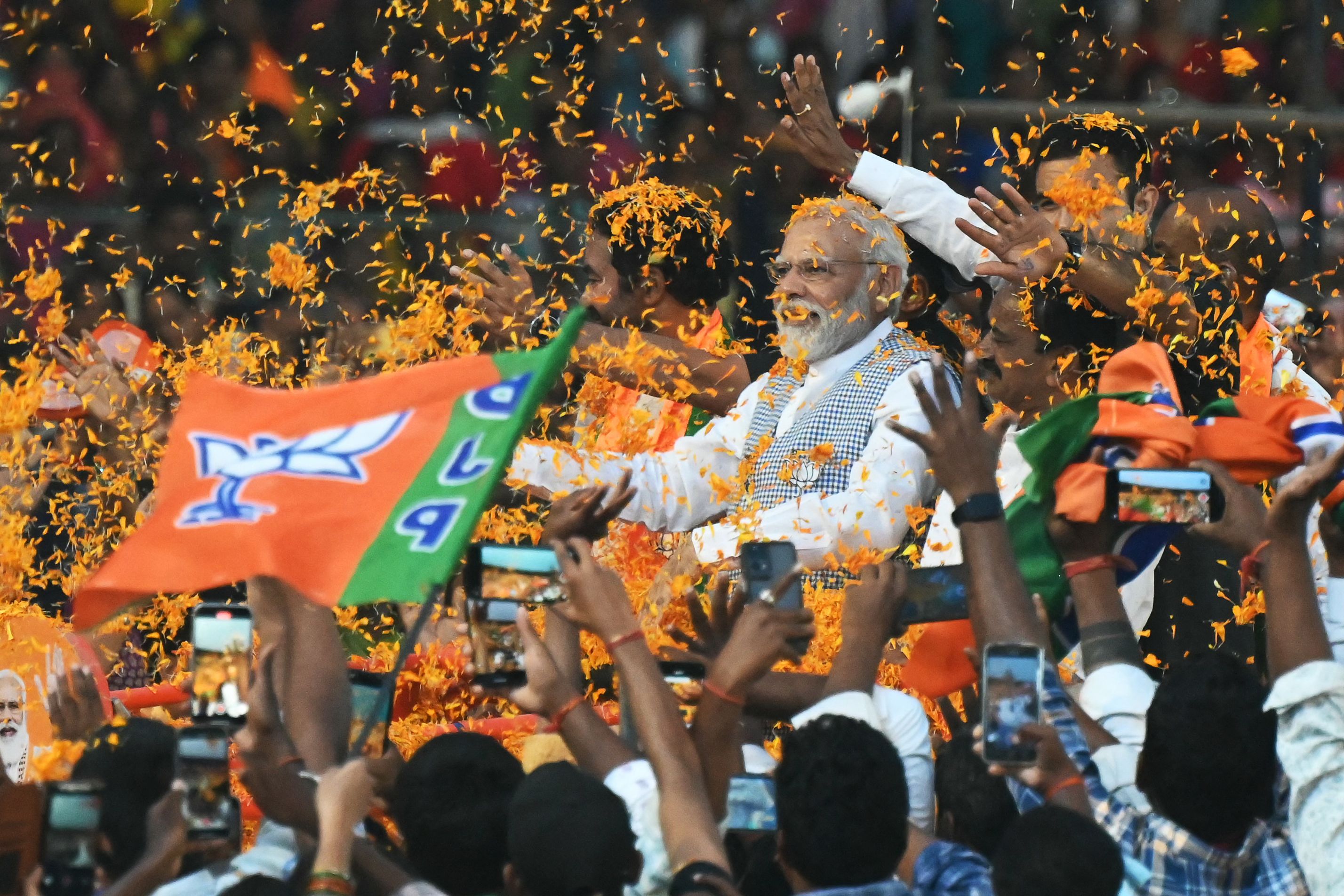What Modi’s state poll victories mean for India’s general election
Defeating Modi’s BJP looks a daunting task after its commanding performances in some major states – but India’s opposition parties still have some reasons to be hopeful

India’s opposition faces a “herculean task” to turn round its fortunes ahead of a general election due in the spring, experts said, after Narendra Modi’s Hindu nationalist ruling party won three out of five key state elections.
One sixth of India was eligible to vote – about 160 million people – in the polls conducted throughout November that included the populous states of Madhya Pradesh and Rajasthan, as well as Chattisgarh, Telangana and Mizoram.
The results, announced on Sunday and Monday, saw Mr Modi’s BJP back in power in Rajasthan and Chattisgarh, former strongholds for the main opposition party Congress, as well as maintaining its dominant position in central Madhya Pradesh.
Congress won a single state, Telangana in the south of India, while the Mizoram election was dominated by two local parties, the BJP coming in a distant third.
The Indian parliament saw chest-thumping sloganeering on Monday from Mr Modi’s BJP workers, who are confident that they can deliver him a record third term as Indian prime minister.
Mr Modi thanked voters for “their unwavering support” in the states where his party was victorious. “The results in Chhattisgarh, Madhya Pradesh and Rajasthan indicate that the people of India are firmly with politics of good governance and development, which the @BJP4India stands for,” Modi wrote on social media platform X.
Rahul Gandhi, the Congress leader, conceded defeat in the states where his party lost, while thanking the people of Telangana. “The battle of ideology will continue,” he wrote on X.
The results were being closely followed ahead of the world’s largest exercise in democracy, a general election that is expected to be held in May. “After these results, it looks like there is no stopping Modi,” said Yashwant Deshmukh, a polling expert with the agency C-Voter, adding that stopping Modi would be a “herculean task” for the opposition.
But for Dr Anand Kumar, a retired professor of sociology at Jawaharlal Nehru University, said there were glimmers of hope in the state results in spite of the headline losses.
After two election cycles in which the BJP and Mr Modi have dominated Indian politics, more people are now returning to the Congress as an alternative, Dr Kumar said, pointing to the fact that the grand old party of Gandhi and Nehru secured a vote share of almost 40 per cent or more in all of Rajasthan, Chhattisgarh and Madhya Pradesh.
“Now it’s their task to turn these vote shares into seats. Indian voters at the moment are impressionable and can be impressed if approached well by the opposition,” he said.
While state elections are typically fought on local issues in India, Dr Kumar argues that anti-incumbancy can never be ruled out on the national stage. May’s elections will come at a time when India is facing multiple challenges, including rising unemployment and fuel prices, concern among many over mounting attacks by Hindu nationalists on the country’s minorities, particularly Muslims, and a shrinking space for dissent and a free press.
And though Mr Modi may maintain remarkable levels of personal popularity, his party has clashed with some major groups of voters in his second term – none more so than northern India’s farmers, who protested and finally forced a U-turn on a package of major agricultural reforms.
One criticism of India’s opposition in 2019, when Mr Modi won by an unexpected landslide, was that it failed to present a united front to take advantage of any unease with the government.
That will not be the case next year, with India’s previously fractured opposition having formed an unprecedented alliance of 28 parties led by Congress, dubbed “INDIA”.
“The BJP is stoppable for the logic of India being a democracy and for the concept of incumbency,” Dr Kumar said. “They have had glaring failures in delivering on their promises in the past nine years. Their weakness is aggravated by their hate politics in India, which has had its impact on the secular society.”
Join our commenting forum
Join thought-provoking conversations, follow other Independent readers and see their replies
Comments
Bookmark popover
Removed from bookmarks